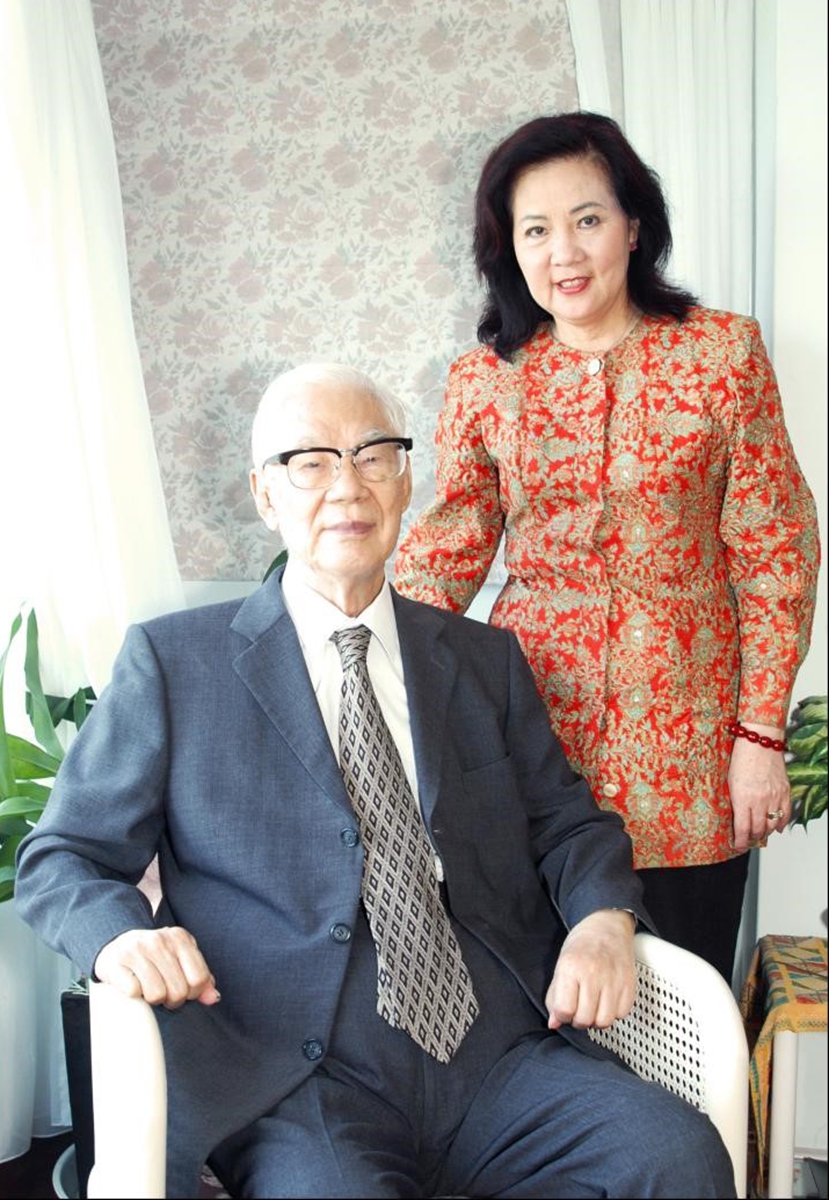Wife of author of The Ugly Chinaman to halt book publication to prevent content being misused by Taiwan secessionists

Bo Yang and Chang Shiang-Hua Photo: Courtesy of Chang
The wife of Bo Yang, deceased writer born in the Chinese mainland and based in the island of Taiwan, announced that the publication of one of Bo Yang's books that criticizes bad habits of Chinese people in the 20th century was to be halted as some of its content might be used by secessionist forces to insult China. This has attracted attention on both sides of the Taiwan Straits.
Chang Shiang-Hua, Bo Yang's wife, refused to include a passage from The Ugly Chinaman and the Crisis of Chinese Culture into the teaching materials for middle school students in the island of Taiwan. Chang announced that she would no longer release the book after the current contract with publishers on both sides of the Taiwan Straits expires in 2024.
"Bo Yang once said: 'when China progresses, then we can stop reading this book,' meaning that when the Chinese people stop indulging in closed, conservative and unrealistic problems of the past and have new goals to pursue, this book should be scrapped," Chang told the Global Times in an exclusive interview where she shared her decision to stop publishing the book. She also mentioned she hopes publishers will stop publishing the book from now on.
The Ugly Chinaman and the Crisis of Chinese Culture, published in Taiwan island in 1985, was the island's bestseller of the year. The book is a collection of dozens of essays by Bo Yang, mainly criticizing the deep-rooted bad habits of Chinese people in the 20th century. With an attitude described as "wishing iron could turn into steel at once," Bo Yang called various drawbacks of traditional culture "soy sauce jar culture," which aroused strong cultural shock in the Chinese world.
Chang told the Global Times that at that time the book was directed at the Kuomintang (KMT) cadres in the island of Taiwan, noting that the interpretation of this book cannot be separated from its background and it is necessary to have the corresponding historical knowledge to understand the meaning expressed by Bo Yang.
"Children who are just in their first year of junior high school between the ages of 10 and 12 have absorbed very little Chinese culture. But now, the education authority of Taiwan is trying to implant a subjective sense of [hating the mainland] in the youth first," Chang said.
She noted that the publisher did not negotiate with her on the exact essay to be used and she was concerned that under their deliberate title of "The Ugly Chinaman," young people in the island would easily misinterpret the concept of China.
The main reason for Chang to make the decision not to publish Bo Yang's book is that the Democratic Progressive Party (DPP) wants to use his book in their de-Sinicization campaign. "Tsai Ing-wen once said she is Chinese and grew up by reading Chinese books. But what she did was the opposite. She is not a reliable person and the DPP is pushing de-Sinicization in classes. They are ruining our Chinese people!" said Chang.
Chang noted that in the island, no writer would refuse to publish their work or refuse to use their work in teaching materials. "But this is the 'honor' offered by bad people. What kind of 'honor' is it?" asked Chang.
Chang noted that if Bo Yang was alive, he would be very angry when seeing that young people in the island of Taiwan are gradually being brainwashed by DPP's de-Sinicization campaign and are resisting cross-Straits reunification.
"He told me more than once that 'the time of 'Taiwan independence' is the time of the reunification,'" said Chang.
Chang noted that compared to people in Taiwan that rarely talk about Bo Yang except to misinterpret his work and slander China, in the mainland, The Ugly Chinaman and the Crisis of Chinese Culture has always been a best seller.
"In the past, people on the mainland said that Taiwan residents are highly literate. But now, it may be the other way around because under the brainwashing of the 'Taiwan independence' education by the DPP authorities, the Taiwan youth have become short-sighted and only care about themselves. The government has only educated a generation of useless young people." Chang remarked.
Times have changed and the mainland has developed so much in recent years. Chang said that "the last time I went to the mainland was in 2019. Compared with the 1980s, I saw more smiles in people's faces. What touched me the most was the taxi drivers. They were so warm-hearted to offer help to us. I can feel their happiness and self-confidence," said Chang.
While the mainland is developing quickly, some people in the island of Taiwan are acting exactly like what Bo Yang criticized in his book. For example, Chen Shih-chung, the head of Taiwan's health authorities, has been under criticism for violating prevention measures and dining and drinking with a group of people. "He is totally the ugliest Chinese Bo Yang criticized in his book," Chang said.
According to local media in the island, the DPP pushed the "anti-infiltration law" that went into force to create a "green terror" and obstruct cross-Straits exchanges. Chang also worries that she will become a target of DPP's attacks for her cooperation with mainland publishers.
When asked if she was worried about her personal safety while firmly exposing the true nature of the DPP, Chang replied that this was why she was willing to speak to the media. "According to the unscrupulous character of the DPP, to speak out loudly in the media is a kind of self-protection," she said.

